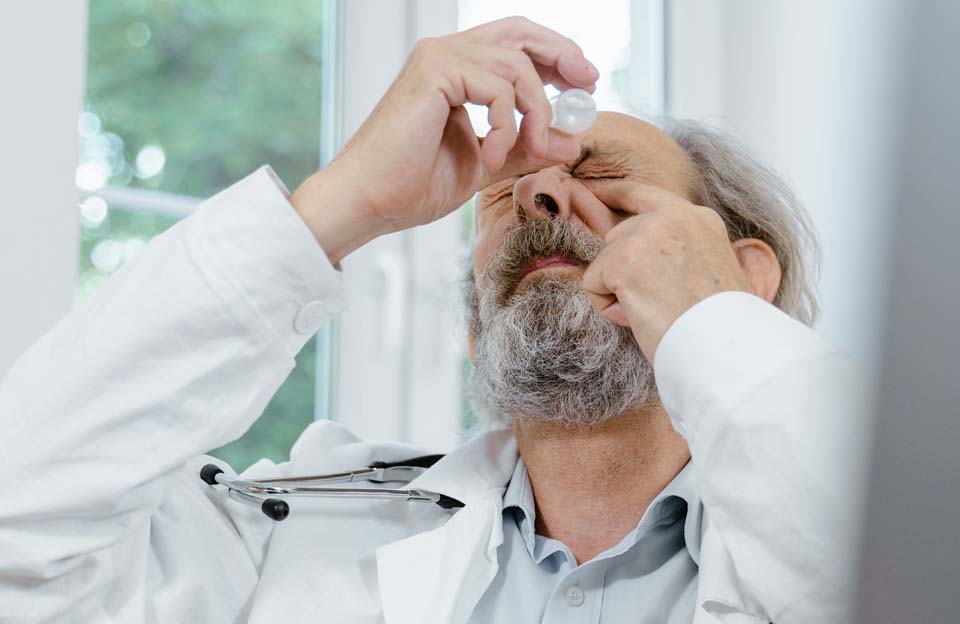Managing diabetes requires careful consideration of various factors, including the potential impact of medications on blood sugar levels. This article delves into a specific query: Can eye drops affect blood sugar? While eye drops are designed for ocular health, understanding their potential influence on glucose regulation is crucial for individuals with diabetes. We explore this connection, providing insights into what those managing diabetes need to be mindful of when using eye medications.
Steroid and Blood Glucose
Steroids and blood glucose have a complex relationship, with steroids potentially leading to increased blood sugar levels in both individuals with and without diabetes. Here’s a breakdown:
Mechanisms of Steroid-Induced Hyperglycemia:
- Gluconeogenesis: Steroids stimulate the liver to produce more glucose, resulting in higher blood sugar levels. [1]
- Insulin resistance: Steroids can decrease the body’s sensitivity to insulin, hindering its ability to transport glucose into cells, thereby causing it to accumulate in the bloodstream.
- Delayed glucose uptake: Steroids can directly impair the process of glucose uptake into muscle and fat cells, further contributing to hyperglycemia. [2]
Risk Factors for Steroid-Induced Hyperglycemia:
- Pre-existing diabetes: Individuals with diabetes are at a higher risk of experiencing significant blood sugar fluctuations upon steroid use.
- Dose and duration of steroid therapy: Higher doses and longer durations of steroid use increase the risk of hyperglycemia. [3]
- Type of steroid: Certain types of steroids, such as glucocorticoids, have a more pronounced effect on blood sugar compared to others.
- Individual factors: Age, obesity, and existing metabolic conditions can influence the susceptibility to steroid-induced hyperglycemia.
Research Findings on Steroid Eye Drops and Glucose Levels
While the relationship between steroid eye drops and glucose levels remains under investigation, here’s a deeper dive into the current research findings:
Studies on Short-Term Use
Effect of intense, short-term topical dexamethasone disodium phosphate eyedrops on blood glucose level in diabetic patients: This study examined the impact of a 7-day course of dexamethasone eyedrops on blood sugar in diabetics. While a transient increase in glucose levels was observed initially, it returned to baseline after discontinuing the drops. [4]
Prednisolone eye drops and blood sugar levels in patients with open-angle glaucoma: This study evaluated the effect of 6-week topical prednisolone therapy on glucose levels in glaucoma patients. No significant changes in blood sugar were observed compared to the control group. [5]
Mixed Results
Topical corticosteroids and diabetes mellitus: This review article discusses the potential risks of using topical corticosteroids, including eye drops, in individuals with diabetes. While acknowledging conflicting evidence, it highlights the need for further research to clarify the long-term effects on glucose control. [6]
Long-Term Studies Needed
Glucocorticoid use and diabetes mellitus: This review highlights the lack of substantial evidence regarding the long-term impact of topical corticosteroids, including eye drops, on glucose levels in individuals with and without diabetes. It emphasizes the need for well-designed, long-term studies to address this knowledge gap. [7]
Individual Factors Matter
The influence of topical corticosteroids on glucose metabolism and glycemic control in patients with diabetes mellitus: This article acknowledges the potential impact of individual factors such as age, pre-existing medical conditions, and type of steroid used on the glucose response to topical steroids. Further research is needed to determine the role of these factors in individual risk assessment. [8]
In summary, While some studies suggest a potential link between short-term steroid eye drop use and minor fluctuations in blood sugar levels, particularly in individuals with diabetes, the evidence remains inconclusive for long-term effects. Further research is crucial to understand the full picture and guide patient care.
Shall I Worry about Steroid Eye Drop with Diabetes?
Whether you should worry about steroid eye drops with diabetes depends on several factors, and it’s crucial to discuss this with your doctor to make an informed decision. Here’s a breakdown.
Potential concerns
- Short-term studies suggest a possible link between steroid eye drops and slight increases in blood sugar levels, particularly in individuals with diabetes.
- Prolonged use of steroids may further impact glucose metabolism, but long-term studies are still lacking.
- Individual factors like age, pre-existing medical conditions, and the specific type and dosage of steroid used can also influence the risk.
Reasons not to worry excessively
Many studies haven’t found significant blood sugar changes with short-term steroid eye drop use. Even in cases with slight increases, they’re often transient and return to baseline upon discontinuing the drops.
Therefore, with proper monitoring and management of your diabetes, you can mitigate potential risks.
Recommendations
- Always talk to your doctor before using steroid eye drops, especially if you have diabetes.
- Explain your diabetes history and any concerns you have about blood sugar fluctuations.
- Your doctor can weigh the benefits of the eye drops against the potential risks and advise on the best course of action.
- If you use the drops, monitor your blood sugar levels closely and inform your doctor of any significant changes.
- Work with your doctor to adjust your diabetes management plan as needed to ensure optimal blood sugar control.
In a nutshell, while some potential concerns exist, worrying excessively about steroid eye drops and diabetes is not recommended without a personalized assessment. Consult your doctor, be informed, and work together to manage your eye condition and diabetes effectively.
FAQ
How do I control my blood sugar while on steroids?
Managing blood sugar while on steroids is crucial, as steroids can raise blood sugar levels in both individuals with and without diabetes. Here are some ways to control your blood sugar while on steroids:
Before starting steroids:
- Talk to your doctor. Discuss your diabetes management plan and potential concerns about blood sugar control with steroids.
- Get your baseline blood sugar levels checked. This will help you and your doctor track any changes during steroid treatment.
During steroid treatment:
- Monitor your blood sugar levels frequently. Your doctor will recommend how often to check based on your individual situation and type of steroid.
- Adjust your diabetes medication, if necessary. Your doctor may need to adjust your insulin dose or other diabetes medications to compensate for the effects of steroids.
- Maintain a healthy diet. Choose nutritious foods that are low in sugar and carbohydrates.
- Get regular exercise. Physical activity helps your body use insulin more effectively.
- Manage stress. Stress can raise blood sugar levels. Relaxation techniques like yoga or meditation can be helpful.
- Report any significant changes to your doctor. This includes unusual fatigue, increased thirst, frequent urination, blurred vision, or slow-healing wounds.
Remember, close monitoring and communication with your doctor are key to managing your blood sugar effectively while on steroids. Don’t hesitate to ask questions or raise concerns with your healthcare team.
How to prevent eye damage from diabetes?
Preventing eye damage is crucial for individuals with diabetes, as diabetes can lead to conditions such as diabetic retinopathy, macular edema, and other eye complications. Here are key steps to prevent eye damage in diabetes:
- Regular Eye Exams: Schedule regular comprehensive eye exams with an eye care professional, such as an ophthalmologist or optometrist. Early detection and intervention are vital in preventing and managing diabetic eye diseases.
- Control Blood Sugar Levels: Maintain tight control of your blood sugar levels. Consistently monitor and manage your blood glucose as recommended by your healthcare provider. Well-managed diabetes reduces the risk of diabetic eye complications.
- Control Blood Pressure and Cholesterol: Manage blood pressure and cholesterol levels. High blood pressure and cholesterol can contribute to eye problems, so work with your healthcare team to keep these levels within a healthy range.
- Maintain a Healthy Diet: Adopt a balanced and nutritious diet that includes a variety of fruits, vegetables, whole grains, lean proteins, and healthy fats. Proper nutrition supports overall health, including eye health.
- Regular Exercise: Engage in regular physical activity as advised by your healthcare provider. Exercise promotes good circulation and can contribute to overall diabetes management.
- Quit Smoking: If you smoke, quit. Smoking increases the risk of diabetic retinopathy and other eye complications. Seek support from healthcare professionals or smoking cessation programs.
- Manage Stress: Chronic stress can impact overall health, including eye health. Practice stress-reducing techniques such as deep breathing, meditation, or yoga.
- Eye Protection: Protect your eyes from injury. Wear safety glasses when necessary, and use sunglasses with UV protection to shield your eyes from harmful ultraviolet rays.
- Follow Medication Regimen: Take medications as prescribed by your healthcare provider. If you have been prescribed medications for diabetes, blood pressure, or cholesterol, adhere to the recommended regimen.
- Know Your Family History: Understand your family history of eye diseases. Some eye conditions may have a genetic component, so being aware of your family history can inform your risk assessment and preventive measures.
- Attend to Symptoms Promptly: If you experience changes in vision, eye pain, or any other unusual symptoms, seek prompt medical attention. Early intervention can prevent further damage.
Remember, regular eye exams are a cornerstone of preventing and managing diabetic eye complications. It’s important to work closely with your healthcare team to create a personalized plan for diabetes management, including strategies to protect your eyes. If you have specific concerns or questions about your eye health, consult with your healthcare provider or an eye care specialist.
What should I do if I have itchy eyes due to diabetes?
Here are some useful suggestions:
- See your doctor: To determine the cause of your itchy eyes and get the right treatment, it’s important to see your doctor. They can perform an eye exam and rule out any serious conditions.
- Try over-the-counter remedies: In the meantime, you can try using over-the-counter artificial tears to help lubricate your eyes. You can also apply a cool compress to your eyes for a few minutes to relieve itching.
- Avoid rubbing your eyes: Rubbing your eyes can make the itching worse and can also spread bacteria, which can lead to an infection.
- Avoid allergens: If you think your itchy eyes are caused by allergies, try to avoid triggers like pollen, dust mites, and pet dander.
- Manage your blood sugar: If your blood sugar is not well-controlled, it’s important to work with your doctor to get it under control. This can help to improve your symptoms of dry eye.
To Wrap up
Even though some potential concerns exist, worrying excessively about steroid eye drops and diabetes is not necessary without a scientific personalized assessment. Consult your doctor, be informed, and work together to manage your eye condition and diabetes effectively.
References
- Conn JW, Fajans SS. Influence of adrenal cortical steroids on carbohydrate metabolism. Metabolism. 1956;5(1):114-127.
- Ceriello A, Novials A, Ortega E, et al. Steroid-induced hyperglycemia: an update. Diabetes, Metabolic Syndrome and Obesity: Targets and Therapy. 2014;7:535-546.
- Aziz M, Patel S, Szabo A. Steroid-induced diabetes: a review of the literature. Journal of Diabetes and Its Complications. 2021;35(10):107942. (Discusses risk factors and management of steroid-induced diabetes)
- Kymionis GD, Panagiotoglou T, Tsilimbaris MK. The effect of intense, short-term topical dexamethasone disodium phosphate eyedrops on blood glucose level in diabetic patients. Ophthalmologica. 2007;221(6):426-9. doi: 10.1159/000107505. PMID: 17947832.
- (n.d.). AAO and AGS Statement on Glaucoma Eye Drop Availability. American Academy of Ophthalmology. https://www.aao.org/education/clinical-statement/aao-ags-statement-on-glaucoma-eye-drop-availabilit
- van der Linden MW, Penning-van Beest FJ, Nijsten T, Herings RM. Topical corticosteroids and the risk of diabetes mellitus: a nested case-control study in the Netherlands. Drug Saf. 2009;32(6):527-37. doi: 10.2165/00002018-200932060-00008. PMID: 19459719.
- Li, J., & Cummins, C. L. (2022). Fresh insights into glucocorticoid-induced diabetes mellitus and new therapeutic directions. Nature Reviews Endocrinology, 18(9), 540-557. https://doi.org/10.1038/s41574-022-00683-6
- Hongo, Y., Ashida, K., Ohe, K., Enjoji, M., Yamaguchi, M., Kurata, T., Emoto, A., Yamanouchi, H., Takagi, S., Mori, H., Kawata, N., Hisata, Y., Sakanishi, Y., Izumi, K., Sugioka, T., & Anzai, K. (2017). Change of Oral to Topical Corticosteroid Therapy Exacerbated Glucose Tolerance in a Patient with Plaque Psoriasis. The American journal of case reports, 18, 1198–1203. https://doi.org/10.12659/ajcr.905470


